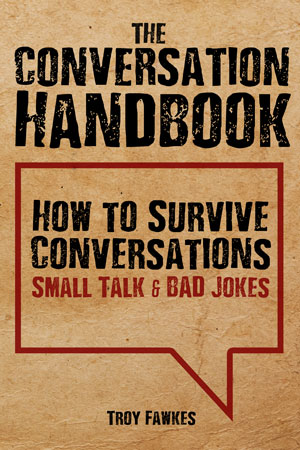Threading is a solution that lets you take a single sentence and turn it into a dozen conversation topics. If you can find the threads in any sentence, this means that you’ll never run out of topics.
To get the most out of threading, follow these three rules.
1) Think of sentences as groups of ideas, not just single concepts.
When you’re nervous, you tend to hyper-focus. It doesn’t matter what you’re doing, your brain is on a single track and you stop seeing what’s around you. This means that when someone speaks to you, you’re likely to just respond to their logical meaning.
Consider the following sentence:
I had to dig my way out of the driveway, probably going to have to work late tonight.
How do I respond? “Yeah, geez that sucks?” Or, “Yeah, I had a terrible commute too?” Both of those more or less kill the thread; you’re forcing your conversation partner to find something else to talk about.
But when you ignore the logical meaning of the sentence and start to look for the ideas in the sentence, you get a vast array of topics to choose from. For example:
- Digging out the driveway reminds me of doing chores.
- It also makes me think of all of the things I’d rather be doing, like Sports and Hobbies.
- It makes me think of what I miss about summer, when there wasn’t any snow.
Start by breaking down statements into ideas, or threads.
2) Pick a thread filled with good emotions.
We’re stopping ourselves from replying to the literal meaning of the statement and finding all of the threads we can imagine from the sentence. We could easily just choose any of those threads and technically continue the conversation.
The problem is, it’s hard to be sure that that conversation is actually going to be interesting.
The trick to finding a good thread is to ask yourself, “Which of these threads has the most good emotions?” Which makes us re-live happy memories, think about wonderful futures, let us share stories or knowledge that we’re proud of or excited by?
Of these threads, which has the most good emotions to you?
- Chores
- Sports & Hobbies
- What I Miss About Summer
Personally, I’d pick Summer.
I had to dig my way out of the driveway, probably going to have to work late tonight.
I definitely miss that part of summer, not having to shovel anything. Also, beaches and camping. Did you do anything interesting last summer?
3) Stay on interesting topics by asking questions and telling stories.
Summer is a great topic. Adventures, good memories and future plans are all a big part of summer. So why would we want to move away from it?
A common pit-fall is to jump around between topics. It might be that we’re not really listening to our conversation partner. We’re spending to much time thinking about what to say next and not enough being interested in who they are and what they have to say.
Instead of letting a good topic slip away, ask questions. What do you plan to do this summer? Have you ever been jet-skiing? If the topic changes slightly due to the question, so be it, but at least you’ve done your part!
Another way to continue along an interesting thread is to tell a story. Instead of asking about jet-skiing, share that you’ve gone before, or talk about what you’d ideally like to do for the summer. Story telling might not be something you’re confident doing, but at least give it a shot.
There’s information and exercises on story telling as well as more exciting ways to continue a conversation in The Conversation Handbook.


